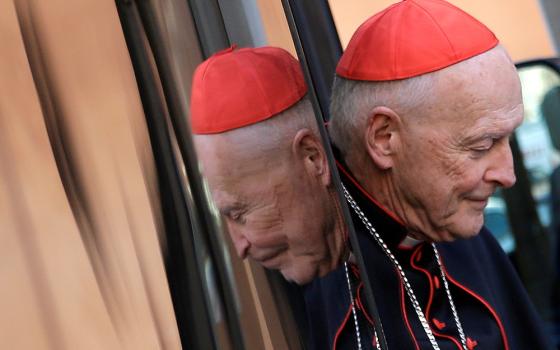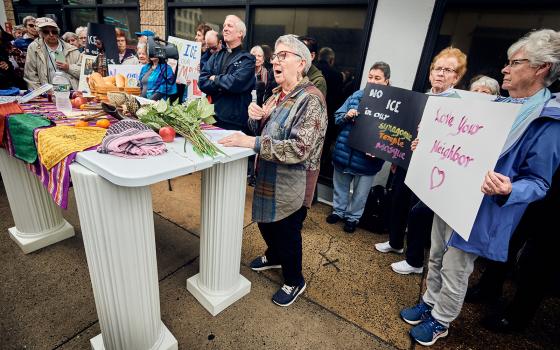Over the weekend, most of the bishops in the United States will head to San Diego for their annual summer meeting. It is not really a meeting and is styled as a retreat, and some bishops do not attend. It is not a full plenary. Nonetheless, this will be the first time most of the bishops will be together since the election of Pope Francis and the first opportunity for the USCCB administrative committee to meet this year: Their March meeting was canceled because of the conclave.
The bishops undoubtedly will use their time together to reflect upon their public witness in the light of the election of Pope Francis. While the new pontiff has made few formal changes and has not issued much in the way of official speeches, he has definitely set an agenda for the church, calling it to be less self-referential and less bound to the sacristy, and encouraged the church to go out to the peripheries, to the margins, to engage people and to love them. He has acknowledged that sometimes going to life's margins to encounter the poor means the risk of making mistakes, but he has bluntly said this is a risk worth taking. If the church remains self-referential, it becomes "sick" and incapable of preaching the Gospel.
I would submit that this has not been the public witness most commonly seen among the U.S. hierarchs in recent years, especially in the last two when they have defined themselves primarily in reference to the ongoing struggle over the controversial HHS mandate. Their posture has been defensive, to say the least, and angry; at times, even bitter.
My friend and colleague Tom Roberts posted an essay Thursday about the contrasting approaches of America's two most prominent Capuchins, Boston's Cardinal Sean O'Malley and Philadelphia Archbishop Charles Chaput. The conference as a whole has been following the Chaput style lately more than the O'Malley style, but it is abundantly clear that it is O'Malley who is cut out of the same piece of cloth as Francis.
Previously, I have suggested that the U.S. hierarchy faces two approaches to the new evangelization, two methods for beating back the forces of secularization. One I call the Becket Fund model, in which the bishops mistake themselves for lawyers, adopt a hostile attitude, dig in and litigate. The other model is best epitomized by the image of Pope Francis washing the feet of an imprisoned Muslim girl on Holy Thursday. I believe the cultural forces that wittingly or unwittingly promote secularization, that invite a forgetfulness of God, do not stand a chance against Francis. They will trounce the Becket Fund approach.
To be clear, it's not the fault of the Becket Fund that they are litigious: That is the work they do, and they do good and important work. But the Becket Fund has no pastoral mission. And for the last couple of years, the USCCB has let a legal strategy trump all else. At first, I believed in and supported a robust opposition to a pernicious four-part definition of what constitutes a religiously exempt organization. Among other things, to qualify as exempt, an institution had to employ and serve primarily co-religionists. That four-part definition was pernicious precisely because it drew a line between our churches and our ministries and seemed therefore to be directed at Catholics. This targeting struck me as anti-Catholic not because of the church's position on contraception, but because of the church's commitment to serving all in need. The Amish, bless their hearts, take care of their own. We take care of everybody. And our ministries harken back to one of the central debates of the Reformation, our Catholic commitment to good works. So there was reason to object. That four-part definition was removed from the mandate in the latest iteration of the rule announced in February.
I bring up the Amish for a reason. They are lovely people and their commitment to living a Christ-like life challenges us all. But their model is not our Catholic tradition. We do not shut out the world; we engage it. And it seems to me that the approach of many bishops in recent years has been to mimic the Amish, to construct walls around a "faithful remnant" of Catholics, close the doors in the face of those who evidence ambivalence, and denounce the culture for its moral turpitude. Setting aside the fact that those denunciations tend to be ideologically one-sided, this dour, pessimistic, denunciatory stance toward the culture is a death sentence for the church, and it sure seems like Pope Francis understands this. The church is called to be pure, and we are all called to holiness, but we are not called to be a sect. The call to serve the poor and the marginalized is itself a primary vehicle for the attainment of holiness. Bishops need to acquire, as Francis said, "the smell of the sheep." Sheep are dirty, not pristine.
The bishops have already committed themselves to a set of lawsuits challenging the HHS mandate. I hope these lawsuits prosper and believe the government's case is weak given the demands of the Religious Freedom Restoration Act (RFRA), which was passed overwhelmingly by Congress and signed by President Bill Clinton. RFRA, you will recall, demands that any government infringement of religious liberty in pursuit of a compelling government interest be achieved with the least burdensome means. In sworn testimony before Congress, HHS Secretary Kathleen Sebelius said she did not even consider the constitutional issues raised by the mandate. If that is true, and I have no reason to doubt her veracity, then she obviously did not examine whether the mandate was the "least burdensome" method of achieving the government's interest.
That said, these lawsuits cannot wag the ecclesiastical dog any longer. It is vital that the bishops in San Diego start thinking about what happens if they should lose the lawsuits. If it has always been unconscionable to think of shutting down ministries that help the poor over something like this, 100 days into the pontificate of Pope Francis, it is now unthinkable. He wants the church to be poor and for the poor. Shutting down ministries that assist the poor is not the way to achieve that goal. In the event, there is no need to shut down anything. We may find government mandates intrusive and obnoxious, but what has become increasingly clear is that compliance with the mandate in no way, shape or form constitutes any kind of impermissible cooperation with evil. The church has always held that remote material cooperation with evil is allowable for a proportionate reason and providing health insurance coverage to your employees is surely one such proportionate reason. Additionally, no one is being tied down and force-fed contraception: We are talking about insurance coverage.
There is a deeper and final point. The phrase "remote material cooperation with evil" strikes many as medieval. But, the reason the church has developed such a theology on this matter is itself testimony to the church's tradition of going out into the world and not becoming an Amish-like sect. There is simply no way to engage a sinful world without somehow participating, even cooperating, in the evil in the world. We all pay taxes, and some of those taxes go for wars many of us thought were evil. We all worry about the effect of carbon on climate change, but we drive our cars to work. We all try to think the best about people, but there is that one guy at work who just really ticks us off. The church has constructed a theology to deal with this phenomenon, a theology that insists there is a difference between paying taxes and serving as an executioner at the Gulag, that it is one thing to commit an evil act and a different thing to invoke the arm of civil law to prohibit evil acts. These distinctions matter. They permit us to stay engaged in the world in ways that help good prosper and evil diminish.
If the bishops do not accomplish anything else in San Diego, they must accomplish this: They must stop talking about compliance with the mandate as cooperation with evil. They may win their lawsuits, they may lose their lawsuits, but they cannot stay out on the material cooperation with evil limb or else they may find themselves in the ridiculous position of having to do an Emily Litella impersonation. (You remember the Gilda Radner character that consistently misheard a news story and constructed an entire editorial position on the mistake. When the mistake was corrected, she would turn the camera and say, "Never mind.") The case can be made that the bishops have misheard the facts of the case regarding the mandate, or at least been subjected to an ideologically driven reading of it, and now find themselves out on a limb. Eventually, they must ask themselves how they got on to that limb, which people and which arguments led them there. But immediately, they must start figuring out how to get off the limb so that, come August when the mandate takes effect and barring any court overturning it, the bishops do not have to face their flocks and say, "Never mind."




